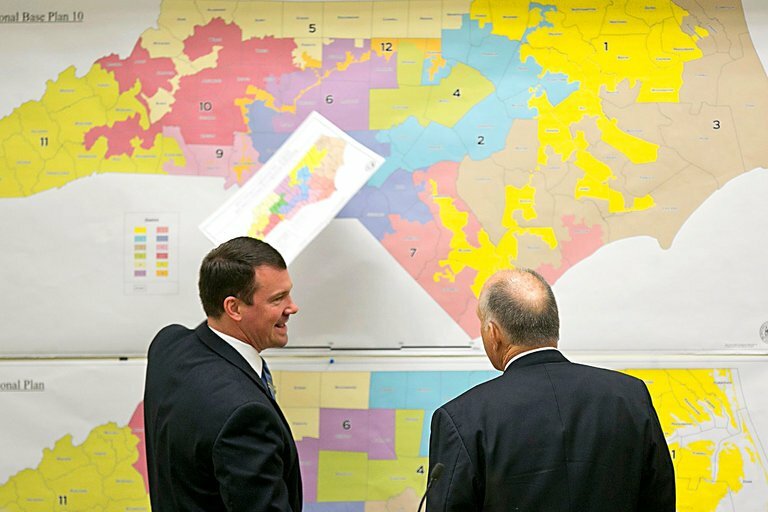- Under North Carolina law, absentee ballots can be delivered in person legally only by the voter or a near relative
- Regardless, the North Carolina State Board of Elections requires county boards of elections to accept illegally transmitted ballots, no questions asked
- Either the State Board of Elections should modify its no-questions-asked policy or the General Assembly should clarify what should be done with illegally transmitted ballots
Under North Carolina law (GS 163-231(b)(1)), absentee ballots can only be “transmitted by mail or by commercial courier service, at the voter’s expense, or delivered in person, or by the voter’s near relative or verifiable legal guardian.” That requirement is important because it helps maintain a chain of custody of the ballot, reinforcing voter protections from ballot harvesting.
If, however, a ballot has been transmitted illegally, or if the legality of a ballot transmission is unclear, what are county boards of elections to do?
The State Board of Elections’ rules for illegally transmitted ballots
They are to act as if the law was not violated, according to a numbered memo issued on September 22, 2020, by Karen Brinson Bell, director of the North Carolina State Board of Elections (SBE). As discussed here last fall, Bell’s Numbered Memo 2020-23 (pages 2-3) states:
Failure to comply with the logging requirement, or delivery of an absentee ballot by a person other than the voter, the voter’s near relative, or the voter’s legal guardian, is not sufficient evidence in and of itself to establish that the voter did not lawfully vote their ballot. A county board shall not disapprove an absentee ballot solely because it was delivered by someone who was not authorized to possess the ballot.
The memo further states that county boards could consider illegal ballot transmission “in conjunction with other evidence in determining whether the ballot is valid and should be counted,” but it does not instruct them to seek any evidence to confirm that the voter wished to have that ballot delivered to the county board by the person who transmitted it or if the voter wished it to be delivered at all.
I reached out to SBE public information officer Patrick Gannon, who said that the SBE instructions are in keeping with election rule 08 NCAC 18 .0102, which was promulgated in 2018 and “is consistent with past agency guidance.” Gannon further stated via email:
It’s helpful to distinguish the illegal action from the ballot itself. It is illegal for the person delivering the ballot to do so if they are not the near relative or legal guardian; it doesn’t make the voter’s action (the casting of the ballot) illegal.
In other words, the SBE asserts that county boards should consider the legality of the ballot itself separately from the legality of how the ballot got to the county board of elections.
That explanation would be fine if the SBE instructed county boards to reach out to the voters in question to discover their intentions regarding the ballots, but the memo gives no such instructions. It also ignores the fact that the ballot would not have come into the county boards’ possession but for the illegal actions that put it there.
How are the state board’s illegally transmitted ballot rules being implemented?
To see how the SBE’s directions are being implemented, I contacted a dozen randomly selected county boards of elections asking how many, if any, absentee-by-mail ballots they received that were hand-delivered without a login record of who delivered the ballot or that were placed in a drop box. Ten of those county boards replied.
The replies revealed wide variation in the number of illegally transmitted ballots and how county boards of elections treat them.
Five counties (Chowan, Franklin, Gaston, Jackson, and Macon) reported that they did not accept any ballots that were not logged in or that had been placed in a drop box. In addition, Durham County reported that they have “no responsive records” of such illegally transmitted ballots. Of course, stating a lack of “responsive records” of illegally transmitted ballots is not the same thing as stating that they did not accept any illegally transmitted ballots.
The director of the Hoke County Board of Elections wrote, “Every ballot that this office received was placed on a log sheet except for one that was delivered to a precinct on Election Day.” Presumably, that ballot was not accepted per SBE instructionsagainst accepting absentee ballots delivered to election day precinct polling places (page 4).
Two other counties (Buncombe and Surry) reported receiving fewer than five illegally transmitted ballots.
The Avery and Columbus county boards of elections did not reply to two attempts to contact them.
Some of the replies indicated uneven compliance with the SBE guidance by county boards. For example, a representative of the Jackson County Board of Elections wrote, “There was a strict policy to collect required information of delivery at the office and one-stop sites, so no one just dropped it off without collecting information.”
New Hanover was the only county surveyed that reported accepting more than five ballots that were not properly logged in. The twist, according to an email from New Haven County Board of Elections Director Rae Hunter‑Havens, is that it was elections board workers who were at fault for the lack of login information:
[They had] 14 absentee-by-mail ballots returned to One Stop locations where the returner was unknown, attributed to election official error in accepting the ballot without recording the return information on a laptop. The Board approved these 14 ABS ballots because they did not want to penalize the voter for an election official error.
So even in the case in which a county had accepted more than ten absentee ballots without the legally required login information, the decision to accept the ballots was for a reason other than complying with the SBE’s order.
The New Hanover board reported that they had rejected a ballot that had been “returned through the Tax Department’s drop box.” In addition, on October 27 the New Hanover board rejected “26 absentee-by-mail ballots, received since the last Board meeting, which were returned by an ineligible person, not the voter or a statutory near relative” (see the official minutes of that meeting on page three). It is another sign of local noncompliance to the SBE’s order to accept illegally transmitted ballots.
What to do
The relatively low number of illegally transmitted ballots accepted by county boards of elections and the documented noncompliance by county boards of election to the SBE’s instructions that illegally transmitted ballots be accepted, no questions asked, show that most of the people doing the day-to-day work of elections administration know the importance of complying with both the spirit and the letter of election law.
The quickest and easiest way to fix the problem would be for the SBE to bring its policy more in line with the law by instructing county election boards at least to make inquiries about the origin of illegally transmitted ballots they find in their possession.
If the SBE fails to do that, the General Assembly should consider further clarifying a law that should already be clear: that only legally transmitted ballots will be accepted. The language could be a simple modification of the more explicit language regarding absentee ballot requests found in 163-230.2.(e), which makes it clear that a request is only valid if returned by mail, courier, or a person authorized to do so.
The SBE’s direction to county boards on illegally transmitted ballots is counter to state law and should be corrected, either by State Board itself or the General Assembly.


